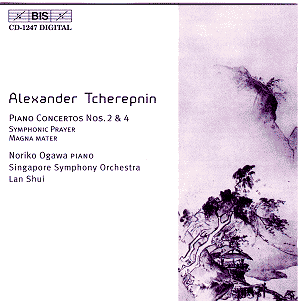This is a very attractive disc. Tcherepnin’s immediately appealing and original brand of neo-classicism coupled with his striking orchestration, are easy on the ear without being lightweight. I had not come across any of the works before, but all have their strong points.
The Symphonic Prayer makes a bold opener to the disc. With a title like that you might be forgiven for expecting something cheesy or in a cod-Hollywood fashion. Nothing could be further from the truth. As the massive, sonorous string opening makes clear, Tcherepnin was aware of the bolder experiments in European music, and though he was a little behind the times in 1959, the musical language is angular, rugged and uncompromising. The modal harmony hints at religious ritual, as does the passing reference to the dies irae, but everything is couched in strong brass and percussion-led dressing that sounds more like early Bartók or Prokofiev. It makes a great listen.
The next item is the earliest piece on the disc, the one movement Piano Concerto No. 2, and here the ghost of Prokofiev is much stronger. As the sleeve note points out, Tcherepnin was at this time working in Paris, the Mecca of neo-classical modernity, so the influences are not surprising. But again the work is great fun and superbly scored. The quirkily inventive main theme is announced (after a customary Prokofiev-like snare drum roll) on solo trumpet, and it is a naggingly memorable tune that sticks in the mind. The whole piece is well worth getting to know, and if you enjoy the works of Martinů or Honegger, you’re sure to respond to this.
The short Magna Mater, dating from just a few years after this concerto, celebrates the spirit of the dance in a Rite-like frenzy of percussion and brass. It is noisy but controlled, and has moments of great beauty and chamber transparency to offset the barbarism.
The Piano Concerto No.4 dates from 1947, just before the composer’s emigration to America. It bears the subtitle Fantasie and is an extreme contrast to the earlier concerto. Here melodic material takes second place to atmosphere, and Tcherepnin the master orchestrator makes his skills keenly felt. All the movements have individual titles showing the influence of Eastern mysticism, none more so than the long (16 minute) opener, Eastern Chamber Dream. The use of percussion here is in marked contrast to the earlier work, and xylophone and wood block are employed to delicately mingle with the rippling cascades from the pianist. Indeed, the piano is less a soloist here and more an addition to the percussion department. Tcherepnin’s Russian roots do still surface and there is what must surely be an intentional nod to Tchaikovsky at around 15.00 (track 4). The tender beauty of the slow movement’s main cor anglais theme is a welcome foil, but the high spirits and optimism that characterise his earlier music surface again in the short rondo finale, with its Petrushka-like exuberance.
The performers clearly enjoy themselves, as well they should. Noriko
Ogawa’s stunning virtuosity is a joy to hear, and the orchestra responds winningly to their conductor, even if the strings struggle occasionally with the cruelly high writing in the Symphonic Prayer. It has become the norm to say that BIS recordings are demonstration quality, but it is certainly the case here. A very entertaining disc, worthy of any serious music lover’s attention.
Tony Haywood
